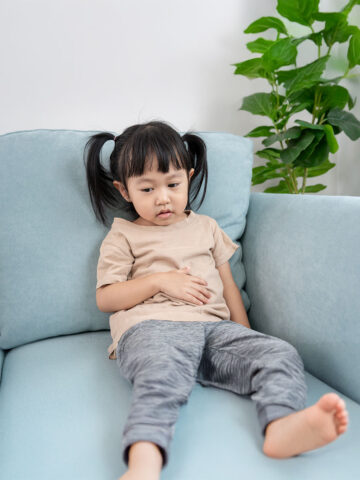Throwing up is no fun, for kids and parents alike. It can also be alarming. A pediatrician in CHOC’s primary care network explains what causes children to vomit and when to be concerned enough to call the doctor.
Vomiting, stomach flu and stomach viruses in kids
The most common cause of throwing up is a stomach virus, otherwise known as the stomach flu or acute gastroenteritis, according to Dr. Reshmi Basu. It is often accompanied by diarrhea. Vomiting could also be caused by reflux in babies, a toddler’s aversion to certain smells or foods, motion sickness, food allergies, food poisoning, urinary tract infection, appendicitis or other less common conditions.
“It’s also really common for a child to cough so hard that they throw up,” Dr. Basu says. “This can be scary, but should go away once the underlying cause of the cough is resolved.”
Treatments for vomiting and stomach bugs for kids
Treatment for vomiting varies depending on the cause. In some cases, anti-nausea medication may be prescribed to give your child some relief. A stomach virus should clear up on its own after a few days. When vomiting is caused by reflux, food allergies or motion sickness, the underlying issue can be treated.
A child who vomits one time and has no other symptoms should be fine, Dr. Basu says. They may just have an upset stomach or strong gag reflex.
When to call the doctor for a vomiting child
Call the doctor if your child:
- Is throwing up for more than two days but has no other symptoms
- Has severe abdominal pain with vomiting
- Has severe headaches with vomiting
- Has a high-grade fever with vomiting
- Has unexplained weight loss with vomiting, or
- Has any signs of dehydration (see below).
“Also, if your child or teen is throwing up periodically over a prolonged period of time, without any obvious reason, I would want to investigate that,” Dr. Basu says.
Watch out for dehydration in kids
Kids who have thrown up multiple times are at risk for dehydration, and that risk goes up the younger they are or if they also have diarrhea. Signs of dehydration include extreme fatigue, tired-looking sunken eyes, going several hours without urinating, dark urine, dry lips, dry mouth, dizziness, and, in babies, crying without tears or a sunken soft spot. Your child should see a doctor immediately if they have any of these symptoms.
To prevent dehydration, encourage your child to drink lots of fluids. Pedialyte is best, but if they refuse that then offer what they will take such as water or diluted juice, although it is better to avoid milk. Your child’s stomach may only be able to handle small amounts at first. Dr. Basu recommends starting with one tablespoon of fluid; wait 10 minutes, then try two tablespoons, and gradually increase as tolerated.
Your child should see a doctor if they cannot tolerate any liquids.
For more health and wellness resources from the pediatric experts at CHOC, sign up for the Kids Health newsletter.
Find a CHOC Primary Care Pediatrician
From babies to teens, pediatricians from CHOC’s Primary Care Network partner with parents to offer immunizations, sick visits, sports physicals and more.





